#Healthcare Fraud Analytics Market
Explore tagged Tumblr posts
Text
Healthcare Fraud Analytics Market Size Worth USD 12.99 Billion in 2030
The global healthcare fraud analytics market size was USD 1.53 Billion in 2021 and is expected to register a revenue CAGR of 26.7% during the forecast period, according to the latest analysis by Emergen Research. Growing consumer preference for telemedicine consultations, increase in number of patients who require health insurance, better investment returns, and surge in proportion of pharmacy claims and medical insurance-related frauds are major factors driving market revenue growth.

0 notes
Text
10 Innovative Business Ideas That You Can Start Today using AI
Are you tired of the same old business ideas? Are you looking for something innovative and exciting that can set you apart from the competition? Look no further than AI!
Artificial Intelligence (AI) is transforming the business world, and there are countless opportunities for entrepreneurs to capitalize on this emerging technology.
Here are 10 innovative business ideas that you can start today using AI:

Virtual personal shopping assistant: Use AI to create a personalized shopping experience for your customers.
Predictive analytics for sales: Use AI to predict sales trends and adjust your inventory and pricing accordingly.
Automated customer service chatbot: Use AI to provide 24/7 customer service and support.
Voice-activated smart home installation and setup: Use AI to install and set up smart home devices for customers.
AI-powered financial planning and investment advice: Use AI to analyze financial data and provide customized investment advice.
Personalized nutrition and exercise planning: Use AI to create customized nutrition and exercise plans for customers.
Predictive maintenance for equipment: Use AI to predict when equipment will need maintenance or repairs, reducing downtime and saving money.
Automated document classification and organization: Use AI to automatically classify and organize documents for businesses.
AI-powered fraud detection: Use AI to detect and prevent fraud in financial transactions.
Predictive analytics for healthcare: Use AI to analyze patient data and predict healthcare outcomes, improving patient care and reducing costs.
These are just a few examples of the innovative business ideas that are possible with AI. With the right idea and a little creativity, the possibilities are endless.
So, what are you waiting for? Start brainstorming your own AI-powered business idea today! And remember, the key to success is to be innovative, creative, and always stay one step ahead of the competition.
#my writing#marketing#AI#artificial intelligence#digital marketing#e-commerce#business services#entrepreneurship#innovation#predictive analytics#customer service#smart home#healthcare#fraud detection#chatgtp
4 notes
·
View notes
Text
AI & IT'S IMPACT
Unleashing the Power: The Impact of AI Across Industries and Future Frontiers
Artificial Intelligence (AI), once confined to the realm of science fiction, has rapidly become a transformative force across diverse industries. Its influence is reshaping the landscape of how businesses operate, innovate, and interact with their stakeholders. As we navigate the current impact of AI and peer into the future, it's evident that the capabilities of this technology are poised to reach unprecedented heights.
1. Healthcare:
In the healthcare sector, AI is a game-changer, revolutionizing diagnostics, treatment plans, and patient care. Machine learning algorithms analyze vast datasets to identify patterns, aiding in early disease detection. AI-driven robotic surgery is enhancing precision, reducing recovery times, and minimizing risks. Personalized medicine, powered by AI, tailors treatments based on an individual's genetic makeup, optimizing therapeutic outcomes.
2. Finance:
AI is reshaping the financial industry by enhancing efficiency, risk management, and customer experiences. Algorithms analyze market trends, enabling quicker and more accurate investment decisions. Chatbots and virtual assistants powered by AI streamline customer interactions, providing real-time assistance. Fraud detection algorithms work tirelessly to identify suspicious activities, bolstering security measures in online transactions.
3. Manufacturing:
In manufacturing, AI is optimizing production processes through predictive maintenance and quality control. Smart factories leverage AI to monitor equipment health, reducing downtime by predicting potential failures. Robots and autonomous systems, guided by AI, enhance precision and efficiency in tasks ranging from assembly lines to logistics. This not only increases productivity but also contributes to safer working environments.
4. Education:
AI is reshaping the educational landscape by personalizing learning experiences. Adaptive learning platforms use AI algorithms to tailor educational content to individual student needs, fostering better comprehension and engagement. AI-driven tools also assist educators in grading, administrative tasks, and provide insights into student performance, allowing for more effective teaching strategies.
5. Retail:
In the retail sector, AI is transforming customer experiences through personalized recommendations and efficient supply chain management. Recommendation engines analyze customer preferences, providing targeted product suggestions. AI-powered chatbots handle customer queries, offering real-time assistance. Inventory management is optimized through predictive analytics, reducing waste and ensuring products are readily available.
6. Future Frontiers:
A. Autonomous Vehicles: The future of transportation lies in AI-driven autonomous vehicles. From self-driving cars to automated drones, AI algorithms navigate and respond to dynamic environments, ensuring safer and more efficient transportation. This technology holds the promise of reducing accidents, alleviating traffic congestion, and redefining mobility.
B. Quantum Computing: As AI algorithms become more complex, the need for advanced computing capabilities grows. Quantucm omputing, with its ability to process vast amounts of data at unprecedented speeds, holds the potential to revolutionize AI. This synergy could unlock new possibilities in solving complex problems, ranging from drug discovery to climate modeling.
C. AI in Creativity: AI is not limited to data-driven tasks; it's also making inroads into the realm of creativity. AI-generated art, music, and content are gaining recognition. Future developments may see AI collaborating with human creators, pushing the boundaries of what is possible in fields traditionally associated with human ingenuity.
In conclusion, the impact of AI across industries is profound and multifaceted. From enhancing efficiency and precision to revolutionizing how we approach complex challenges, AI is at the forefront of innovation. The future capabilities of AI hold the promise of even greater advancements, ushering in an era where the boundaries of what is achievable continue to expand. As businesses and industries continue to embrace and adapt to these transformative technologies, the synergy between human intelligence and artificial intelligence will undoubtedly shape a future defined by unprecedented possibilities.
19 notes
·
View notes
Text
Top Futuristic AI Based Applications by 2024
2024 with Artificial Intelligence (AI) is the backdrop of what seems to be another revolutionary iteration across industries. AI has matured over the past year to provide novel use cases and innovative solutions in several industries. This article explores most exciting AI applications that are driving the future.
1. Customized Chatbots
The next year, 2024 is seeing the upward trajectory of bespoke chatbots. Google, and OpenAI are creating accessible user-friendly platforms that enable people to build their own small-scale chatbots for particular use cases. These are the most advanced Chatbots available in the market — Capable of not just processing text but also Images and Videos, giving a plethora of interactive applications. For example, estate agents can now automatically create property descriptions by adding the text and images of listings thatsurgent.
2. AI in Healthcare
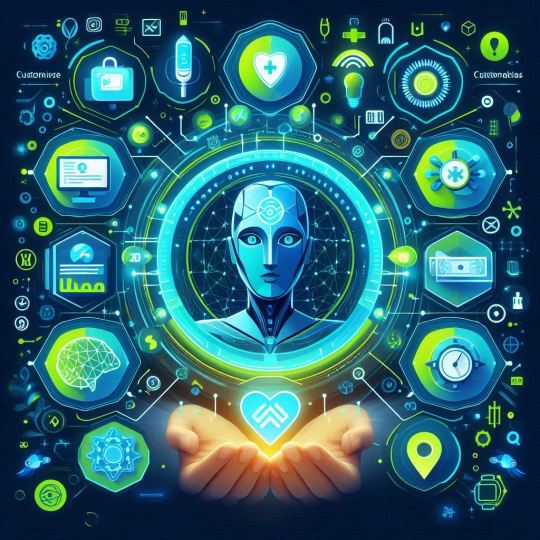
AI has found numerous applications in the healthcare industry, from diagnostics to personalized treatment plans. After all, AI-driven devices can analyze medical imaging material more accurately than humans and thus among other things help to detect diseases such as cancer at an early stage. They will also describe how AI algorithms are used to create tailored treatment strategies personalized for each patient's genetics and clinical past, which helps enable more precise treatments.
3. Edge AI
A major trend in 2024 is Edge AI It enables computer processing to be done at the edge of a network, rather than in large data centers. Because of its reduced latency and added data privacy, Edge AI can be used in applications like autonomous vehicles transportations, smart cities as well as industrial automation. Example, edge AI in autonomous vehicles is able to get and process real-time data, increasing security by allowing faster decision-making.
4. AI in Finance
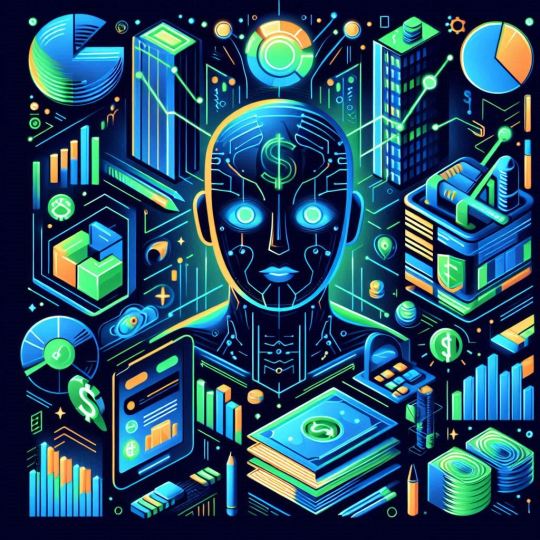
Today, the financial sector is using AI to make better decisions and provide an even stronger customer experience. Fraud detection, risk assessment and customised financial advice have introduced insurance into the AI algorithm. AI-powered chatbots and virtual assistants are now common enough to be in use by 2024, greatly assisting customers stay on top of their financial well-being. Those tools will review your spending behavior, write feedback to you and even help with some investment advices.
5. AI in Education
AI is revolutionizing education with individualized learning. These AI-powered adaptive learning platforms use data analytics to understand how students fare and produces a customised educational content (Hoos, 2017). This way, students get a tailored experience and realize better outcomes. Not only that, AI enabled tools are also in use for automating administrative tasks which shortens the time required by educators on teaching.
6. AI in Job Hunting

This is also reverberating in the job sector, where AI technology has been trending. With tools like Canyon AI Resume Builder, you can spin the best resumé that might catch something eye catchy recruiter among a dozen others applications he receives in-between his zoom meeting. Using AI based tools to analyze Job Descriptions and match it with the required skills, experience in different job roles help accelerating the chances of a right fit JOB.
7. Artificial Intelligence in Memory & Storage Solutions
Leading AI solutions provider Innodisk presents its own line of memory and storage with added in-house designed AI at the recent Future of Memory & Storage (FMS) 2024 event. Very typically these are solutions to make AI applications easier, faster and better by improving performance scalability as well on the quality. This has huge implications on sectors with substantial data processing and storage demands (healthcare, finance, self-driving cars).
Conclusion
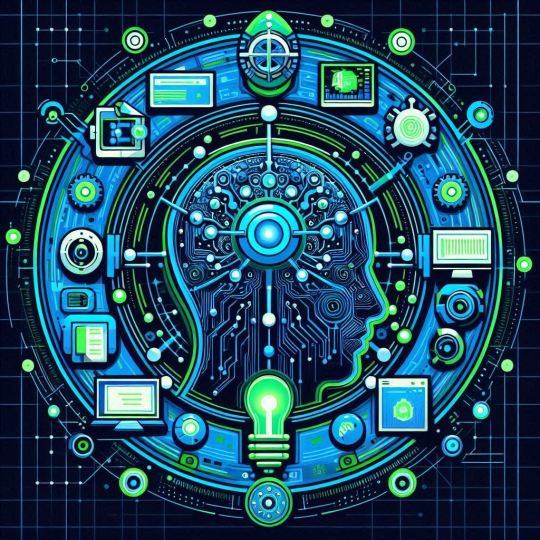
2024 — Even at the edge of possible, AI is revolutionizing across many industries. AI is changing our lives from tailored chatbots and edge AI to healthcare, finance solutions or education and job search. This will not only improve your business profile as a freelancer who create SEO optimized content and write copies but also give your clients in the writing for business niche some very useful tips.
#ai#ai in healthcare#ai in finance#ai in wealth management#ai in business#AI trends#artificial intelligence#advanced technologies#innovation#technological advancements
4 notes
·
View notes
Text
Transforming the Health Landscape: The Global Blockchain in Healthcare Market
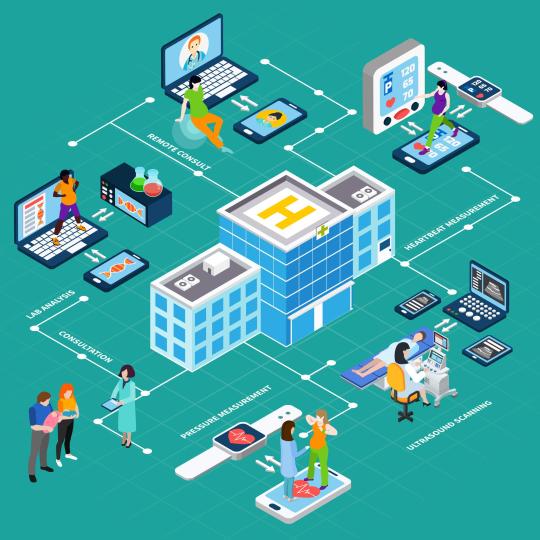
The integration of blockchain technology into the healthcare sector is revolutionizing the way medical data is managed, shared, and secured. As the demand for transparent, efficient, and secure healthcare services grows, blockchain offers promising solutions to longstanding challenges.
Understanding Blockchain in Healthcare
Blockchain Technology is a decentralized digital ledger that records transactions across multiple computers in a way that ensures the security and transparency of data. In healthcare, blockchain can be used to manage patient records, track pharmaceuticals, ensure the integrity of clinical trials, and streamline administrative processes. The immutable nature of blockchain helps in preventing data breaches, ensuring data accuracy, and enhancing patient privacy.
According to BIS Research, the Global Blockchain in Healthcare Market was estimated to grow to a value of $5.61 billion by 2025, and still the market is showing a steep growth till 2030 witnessing a double-digit CAGR growth rate throughout the forecast period.
Key Market Dynamics
Several factors are driving the growth of the global blockchain in healthcare market:
Data Security and Privacy:
Need for robust data security and privacy solutions.
Healthcare data breaches are a growing concern.
Blockchain's secure, immutable nature protects sensitive patient information.
Interoperability and Data Sharing:
Facilitates seamless data sharing between healthcare providers and systems.
Overcomes current interoperability issues.
Leads to better patient outcomes by providing a comprehensive view of health history.
Supply Chain Transparency:
Tracks the entire lifecycle of drugs in the pharmaceutical industry.
Ensures the authenticity of medications.
Helps combat counterfeit drugs.
Efficient Administrative Processes:
Streamlines various administrative processes, such as billing and claims management.
Reduces fraud and administrative costs.
Support from Regulatory Bodies:
Increasing support from regulatory bodies and governments.
Initiatives by FDA and EMA to explore blockchain for drug traceability and clinical trials boost market growth.
Request for an updated Research Report on Global Blockchain in Healthcare Market Research.
Global Blockchain in Healthcare Industry Segmentation
Segmentation by Application:
Data Exchange and Interoperability
Supply Chain Management
Claims Adjudication and Billing Management
Clinical Trials and Research
Others
Segmentation by End-User:
Healthcare Providers
Pharmaceutical Companies
Payers
Others
Segmentation by Region:
North America
Europe
Asia-Pacific
Latin America and Middle East & Africa
Future Market Prospects
The future of the global blockchain in healthcare market looks promising, with several trends likely to shape its trajectory:
Integration with AI and IoT: The integration of blockchain with artificial intelligence (AI) and the Internet of Things (IoT) will enhance data analytics, predictive healthcare, and real-time monitoring.
Expansion of Use Cases: New use cases for blockchain in digital healthcare will emerge, including patient-centered care models, personalized medicine, and enhanced telemedicine services.
Focus on Patient-Centric Solutions: Blockchain will enable more patient-centric healthcare solutions, empowering patients with greater control over their health data and enhancing patient engagement.
Development of Regulatory Frameworks: The establishment of clear regulatory frameworks and industry standards will facilitate the widespread adoption of blockchain in healthcare.
Conclusion
The Global Blockchain in Healthcare Industry is poised for significant growth, driven by the need for enhanced data security, interoperability, supply chain transparency, and efficient administrative processes. By addressing challenges related to regulatory compliance, implementation costs, standardization, and scalability, and leveraging opportunities in technological advancements, investments, partnerships, and government initiatives, the potential of blockchain in healthcare can be fully realized. This technology promises to revolutionize healthcare delivery, enhancing efficiency, transparency, and patient outcomes, and setting new standards for the future of digital health.
#Blockchain in Healthcare Market#Blockchain in Healthcare Industry#Blockchain in Healthcare Market Report#Blockchain in Healthcare Market Research#Blockchain in Healthcare Market Forecast#Blockchain in Healthcare Market Analysis#Blockchain in Healthcare Market Growth#BIS Research#Healthcare
2 notes
·
View notes
Text
Empowering Decision-Making: Unlocking the Potential of Data Science Across Industries
In the era of information abundance, data has become a formidable asset. However, the real distinction for successful enterprises lies in their ability to derive meaningful insights from this vast sea of data. Enter data science – a field that transcends mere analysis and offers a transformative lens through which industries can innovate, optimize, and thrive. Opting for the Best Data Science Institute can further expedite your journey into this burgeoning industry. In this blog, we will delve into the diverse applications of data science across various sectors, spotlighting its pivotal role in steering informed decision-making and fostering innovation.
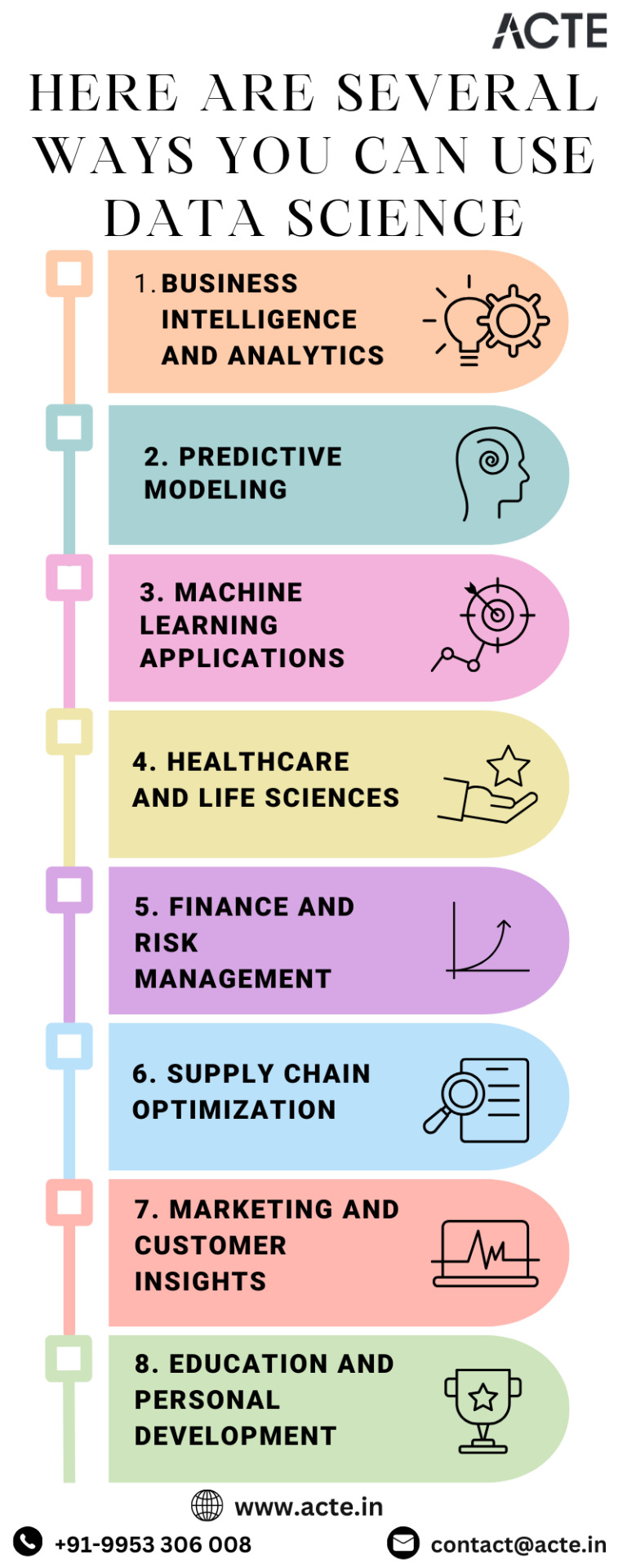
1. Business Intelligence and Analytics: Revealing Patterns for Growth
At the heart of data science is the ability to unravel intricate patterns within extensive datasets. For businesses, this translates into a powerful tool for business intelligence and analytics. By harnessing historical and current data, organizations can gain valuable insights into their performance, identify trends, and make informed decisions that drive growth. Whether optimizing operational processes or uncovering opportunities for expansion, data science serves as a compass for strategic decision-making.
2. Predictive Modeling: Forecasting the Future with Confidence
Predictive modeling stands out as one of the hallmark applications of data science. By analyzing historical data, organizations can develop models that forecast future trends and outcomes. This capability proves invaluable across various domains. In finance, predictive modeling aids in anticipating stock prices; in healthcare, it contributes to predicting patient outcomes. The ability to foresee potential scenarios empowers decision-makers to plan and strategize with confidence.
3. Machine Learning Applications: Infusing Intelligence into Applications
Machine learning, a subset of data science, takes analytical power a step further by enabling intelligent applications. From recommendation systems in e-commerce to fraud detection in finance and image recognition in healthcare, machine learning algorithms bring a layer of automation and adaptability to diverse domains. This not only enhances user experience but also improves the efficiency and effectiveness of various processes.
4. Healthcare and Life Sciences: Revolutionizing Patient Care and Research
In the realm of healthcare, data science acts as a catalyst for transformation. From patient diagnosis to personalized treatment plans and drug discovery, data-driven insights are revolutionizing the industry. Analyzing large datasets allows medical professionals to identify patterns, tailor treatment strategies, and accelerate medical research, ultimately leading to better patient outcomes.
5. Finance and Risk Management: Navigating Uncertainty with Data-Driven Insights
Financial institutions leverage the power of data science for risk assessment, fraud detection, and portfolio optimization. Predictive analytics aids in forecasting market trends, managing risks, and making informed investment decisions. In an industry where every decision carries significant consequences, data science provides a reliable compass for navigating uncertainties. Choosing the finest Data Science Courses in Chennai is a pivotal step in acquiring the necessary expertise for a successful career in the evolving landscape of data science.
6. Supply Chain Optimization: Enhancing Efficiency from End to End
Optimizing supply chain operations is a complex endeavor, but data science offers a clear path forward. By utilizing data to forecast demand, manage inventory effectively, and optimize logistics, organizations can achieve substantial cost savings and improve overall operational efficiency. From manufacturers to retailers, data science is reshaping how businesses approach the end-to-end supply chain process.
7. Marketing and Customer Insights: Tailoring Strategies for Success
In the realm of marketing, data science emerges as a game-changer. Analyzing customer behavior, preferences, and engagement patterns allows marketers to create targeted campaigns that resonate with their audience. The ability to derive actionable insights from data enhances customer experience, improves satisfaction, and maximizes the impact of marketing initiatives.
8. Social Media Analysis: Decoding Trends and Sentiments
The digital era has ushered in an abundance of social media data, and data science plays a crucial role in making sense of this vast landscape. By analyzing social media data, businesses can extract valuable insights into user behavior, sentiment, and trends. This information is instrumental in shaping social media strategies, engaging with the audience effectively, and managing online reputation.
9. Smart Cities and Urban Planning: Paving the Way for Sustainable Living
In the context of urban planning, data science contributes to the development of smart cities. By analyzing data from sensors, traffic cameras, and citizen feedback, urban planners can optimize city infrastructure, improve traffic flow, and enhance overall urban living. Data-driven insights play a pivotal role in creating sustainable and livable urban environments.
10. Education and Personal Development: Shaping the Future of Learning
Data science is making significant inroads into education, where it is utilized to analyze student performance, tailor learning materials, and provide personalized recommendations. This not only enhances the learning experience for students but also facilitates adaptive learning platforms. The application of data science in education is reshaping how we approach teaching and learning, with a focus on individualized and effective educational experiences.

As we delve deeper into the era of big data, data science stands as a beacon of innovation and progress. Its applications span across industries, touching every facet of modern life. From healthcare and finance to education and urban planning, data science is shaping the way we make decisions, solve problems, and envision the future. Embracing the power of data science is not just a choice; it's a necessity for those looking to thrive in a data-driven world.
3 notes
·
View notes
Text
https://aequitasindia.com/ai-and-machine-learning-transforming-business-operations/
AI & Machine Learning: Transforming Business Operations
In the ever-evolving landscape of technology, Artificial Intelligence (AI) and Machine Learning (ML) have emerged as game-changers. These cutting-edge technologies are revolutionizing the way businesses operate, delivering unprecedented efficiency, accuracy, and insights. Let’s delve into how AI & ML are transforming business operations.
1. Data-Driven Decision Making
2. Predictive Analytics
3. Personalization
4. Automation
5. Supply Chain Optimization
6. Fraud Detection
7. Customer Support
8. Natural Language Processing
9. Employee Productivity
10. quality Control
11. Risk Management
12. Healthcare Advancement
13. Marketing and Advertising
14. Energy Efficiency
15. Cybersecurity
Powered by : Aequitas Infotech Pvt. Ltd.
Our website: https://aequitasindia.com/
Follow us on...
LinkedIn: https://www.linkedin.com/company/aequitas-infotech-private-limited/
Twitter (X): https://twitter.com/AequitasInfotec
Facebook: https://www.facebook.com/profile.php?id=61550565488254
Instagram: https://www.instagram.com/aequitas_infotech/
2 notes
·
View notes
Text
"Unveiling the Future: How Data Science is Revolutionizing Upcoming Industries"
Data science continues to have a substantial impact on various industries, and its scope is expected to expand as new technologies emerge and businesses realize the potential of data-driven insights. Here are some upcoming industries where data science is likely to play a significant role:
Healthcare and Life Sciences: Data science can aid in personalized medicine, drug discovery, predictive analytics for patient outcomes, and healthcare operations optimization.
Financial Services: Financial institutions use data science for fraud detection, risk assessment, algorithmic trading, customer behavior analysis, and credit scoring.
Retail and E-Commerce: Data science helps optimize inventory management, pricing strategies, recommendation systems, and customer segmentation for targeted marketing.
Energy and Utilities: The energy sector benefits from data analytics for smart grid management, predictive maintenance of equipment, and energy consumption optimization.
Manufacturing: Data science improves manufacturing processes through predictive maintenance, quality control, supply chain optimization, and demand forecasting.
Agriculture: Precision agriculture utilizes data science to optimize crop yield, resource allocation, pest control, and environmental monitoring.
Transportation and Logistics: Data science plays a role in route optimization, fleet management, demand forecasting, and autonomous vehicles.
Telecommunications: Data science assists in customer churn prediction, network optimization, and personalized service offerings.
Media and Entertainment: Content recommendation, audience segmentation, and analyzing viewer engagement are areas where data science is making an impact.
Real Estate: Data science helps in property price prediction, market trend analysis, and investment decision-making.
Environmental Conservation: Data science aids in monitoring and analyzing environmental data, including climate patterns, pollution levels, and habitat preservation.
Education: Data science can personalize learning experiences, assess student performance, and optimize educational resources.
Government and Public Services: Data-driven decision-making is becoming increasingly important for optimizing public services, policy formulation, and resource allocation.
Insurance: Insurers use data science for risk assessment, claims processing, fraud detection, and customized pricing.
Travel and Tourism: Data science enhances traveler experiences through personalized recommendations, pricing optimization, and destination insights.
Pharmaceuticals: Data science plays a role in drug discovery, clinical trials optimization, and pharmacovigilance.
Smart Cities: The concept of smart cities involves integrating data science for efficient urban planning, traffic management, energy consumption, and public services.
Cybersecurity: Data science helps in identifying and responding to cyber threats by analyzing patterns and anomalies in network data.
As technology continues to advance and businesses recognize the value of data-driven insights, certybox is creating a difference in providing the top professional courses along with job assistance. It's essential for professionals in the field to stay updated with the latest developments and tools to make the most of these opportunities.
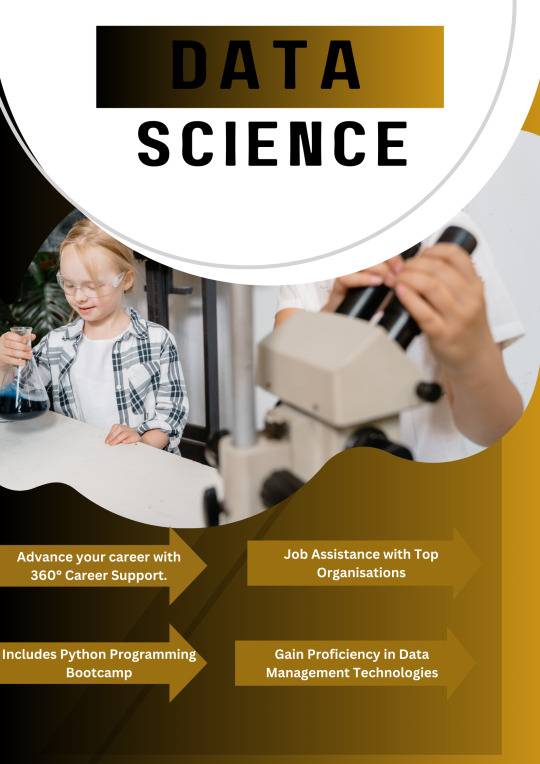
5 notes
·
View notes
Text
Top 3 industries that benefit most from data analytics
Introduction:
In today's data-driven world, businesses across various industries are harnessing the power of data analytics to gain valuable insights and make informed decisions. Data analytics services and solutions have become integral for organizations to thrive and stay ahead of the competition. In this blog, we will explore the top three industries that benefit the most from data analytics and how it revolutionizes their operations.
Healthcare Industry:
By offering practical insights for improved patient care, cost containment, and operational efficiency, data analytics has completely changed the healthcare sector. Healthcare providers can examine vast volumes of patient data to find patterns, forecast disease outbreaks, and improve treatment strategies with the use of powerful data analytics systems. It makes personalised treatment possible, improves clinical judgement, and enhances patient outcomes. Additionally, fraud detection, reducing billing errors, and raising overall healthcare quality all benefit greatly from data analytics.
Retail Industry:
Data analytics services have been adopted by the retail sector to provide it a competitive edge in a very dynamic market. Retailers can customise their marketing campaigns, improve inventory management, and improve consumer experiences by analysing customer data, buying tendencies, and market trends. Retailers can comprehend customer preferences, predict demand, and set prices based on data thanks to data analytics tools. Additionally, it aids in supply chain optimisation, fraud detection, and layout optimisation for improved consumer flow in stores.
Financial Services Industry:
By making fraud detection, risk assessment, and personalised financial advice more accurate, data analytics has completely transformed the financial services sector. Institutions can identify possible hazards, spot fraudulent activity, and stop financial crimes by analysing vast amounts of financial data. In addition, credit scoring, investment portfolio management, and client segmentation all greatly benefit from the use of data analytics tools. Additionally, it aids financial firms in upholding data security and regulatory compliance.
Conclusion:
For many industries, data analytics solutions have become game-changers. While the retail sector obtains knowledge for targeted marketing and enhanced inventory management, the healthcare sector gains from increased patient care and operational efficiency. Data analytics ensures risk reduction and individualised financial services in the financial services industry. These sectors must keep using the power of data analytics to generate new opportunities and spur innovation as data keeps expanding exponentially. Organisations can stay ahead of the competition and make data-driven decisions that support success by utilising the possibilities of data analytics.
2 notes
·
View notes
Text
Unlocking the Future: How AI-Powered Digital Transformation is Revolutionizing Industries
The rise of Artificial Intelligence (AI) is fundamentally changing how industries operate, ushering in a new era of digital transformation. With its ability to process vast amounts of data, make predictions, and automate processes, AI is revolutionizing industries across the globe. From healthcare to manufacturing, AI is unlocking unprecedented opportunities for innovation, efficiency, and growth.
In healthcare, AI is streamlining patient care through predictive analytics and smart diagnostics. Machine learning algorithms are enabling doctors to detect diseases earlier, personalize treatment plans, and even predict patient outcomes. By automating administrative tasks such as scheduling and billing, AI also allows healthcare professionals to focus more on patient care, improving overall efficiency and reducing costs.
In manufacturing, AI-powered automation and robotics are increasing productivity and reducing human error. AI-driven predictive maintenance helps companies anticipate equipment failures before they occur, minimizing downtime and costly repairs. Moreover, AI is optimizing supply chains by analyzing real-time data to forecast demand and improve inventory management, ensuring smoother operations and faster time-to-market.
Retailers are also benefitting from AI by enhancing customer experiences and optimizing inventory management. Personalized recommendations, powered by AI, provide consumers with tailored shopping experiences, while chatbots and virtual assistants streamline customer support. In addition, AI is helping retailers predict trends, ensuring they stock the right products at the right time, reducing waste and improving profitability.
The financial industry has also embraced AI for risk assessment, fraud detection, and algorithmic trading. AI analyzes vast datasets in real-time, identifying anomalies and making predictions with remarkable accuracy. This helps banks and financial institutions make informed decisions faster and with greater precision, enhancing security and performance.
As AI continues to evolve, its potential to drive digital transformation is limitless. The businesses that embrace AI today are the ones that will unlock the future and lead their industries into the next generation of innovation.
0 notes
Text
Technology Guest Post: Top Tech Trends Shaping 2025

Technology is evolving at a pace never before seen, transforming sectors and redrawing the rulebook on the way we live and work. With the arrival of 2025, advancing technologies such as AI, blockchain, and quantum computing are at the forefront of the innovation tide and creating new frontiers. The following technology guest post cites the most relevant tech trends poised to define the future.
1. Artificial Intelligence (AI) & Automation
AI is transforming industries at a fast rate, be it healthcare and finance or customer service and marketing. AI-powered chatbots, generative AI, and automation platforms are optimizing processes, speeding them up, and making them more efficient with enhanced user experiences. Organizations are employing AI to acquire predictive analytics, personal recommendations, and identify fraud to become more competitive.
2. The Rise of 5G & IoT
With increasing numbers of people utilizing 5G networks, the Internet of Things (IoT) is expanding at a rapid pace. The connectivity is being used to make smart cities, autonomous vehicles, and industrial automation smarter. IoT technology is making real-time data capture, predictive maintenance, and remote monitoring possible across industries, improving the efficiency of processes.
3. Blockchain Beyond Cryptocurrency
Blockchain technology has advanced beyond cryptocurrency. In 2025, we will see expanded applications in supply chain management, digital identity, secure transactions, and decentralized finance (DeFi). More businesses are adopting blockchain to offer greater transparency, security, and trust in digital transactions.
4. Quantum Computing: A Game Changer
Quantum computers will transform the traditional computer by solving challenging problems at record speed. IBM, Google, and Microsoft are pushing the frontier of quantum algorithms, cryptography, and simulated artificial intelligence, ushering in to new discoveries in sciences and financial calculations.
5. Sustainable & Green Technology
As more focus has been on sustainability, green technology is a concern for all the companies around the world. Development in renewable energy, carbon capture, smart grids, and energy-efficient data centers is reducing carbon footprints. AI and IoT are perfectly improving the resource efficiency and green methods.
6. Cybersecurity & Data Privacy
With evolving threats against the virtual space, cybersecurity strategies are adapting. Business entities are adopting zero-trust security models, artificial intelligence-driven threat detection, and blockchain-based encryption to secure confidential data. Consumer awareness and data privacy policies are also playing a role in shaping the ways business entities counter digital security.
Final Thoughts
The 2025 technology landscape is dominated by innovation, efficiency, and sustainability. The trends continuing mean that people and businesses need to grow in order to continue being in the game. This technology guest post throws insight into the most significant developments that will define the future, and how the future technologies will dictate industries and everyday life.For more information visit this site: RewardBloggers
0 notes
Text
Empower Your Future with Leading AI ML Development Services by ideyaLabs

AI and ML technologies revolutionize business operations. ideyaLabs provides world-class AI ML development services. Companies grow and exceed their potential with innovative AI ML solutions. The future of technology starts with ideyaLabs.
Why Choose AI ML Development Services from ideyaLabs?
Experts at ideyaLabs bring unmatched experience and expertise in AI and ML. Customized solutions meet each business's unique needs. AI and ML applications transform data into actionable insights. Businesses increase efficiency, reduce costs, and enhance decision-making.
Cutting-Edge AI Solutions
ideyaLabs offers a range of AI ML development services. Predictive analytics, natural language processing, and computer vision lead the pack. Businesses leverage advanced AI algorithms to predict market trends. Real-time analysis of large datasets optimizes operations.
Innovative Machine Learning Models
Machine learning models drive innovation. ideyaLabs develops tailored ML models for predictive maintenance, customer segmentation, and fraud detection. Businesses rely on precise predictions to improve customer satisfaction. Detecting fraud proactively saves money and enhances security.
Exceptional Expertise in Natural Language Processing
Natural language processing (NLP) provides significant advantages. ideyaLabs masters NLP to develop chatbots, virtual assistants, and sentiment analysis tools. Seamless communication between customers and businesses becomes a reality. Businesses understand customer sentiment and refine their strategies.
Future-Proof Your Business with AI Solutions
AI solutions pave the way for future-proof businesses. ideyaLabs ensures long-term success with scalable AI ML development services. AI-powered tools streamline operations and enhance productivity. Businesses stay ahead in a competitive landscape.
Comprehensive Data Analysis
Data forms the foundation of AI ML solutions. ideyaLabs excels in comprehensive data analysis. Businesses derive valuable insights from structured and unstructured data. Data-driven decisions lead to growth and success.
Personalized Customer Experiences
AI-driven personalization enhances customer experiences. ideyaLabs provides solutions to tailor customer interactions. Personalized recommendations and targeted marketing result in increased customer loyalty.
Robust AI Security Solutions
Security remains crucial in AI ML development. ideyaLabs develops robust AI security solutions to protect sensitive data. AI-driven security measures detect and mitigate threats proactively. Businesses maintain trust and security.
Efficient Project Management
Efficient project management guarantees successful AI ML deployments. ideyaLabs emphasizes clear planning and execution. Regular updates and transparent communication ensure client satisfaction. Projects complete on time and within budget.
Industry-Specific AI Applications
AI ML development services cater to various industries. ideyaLabs customizes solutions for healthcare, finance, retail, and more. Industry-specific AI applications address unique challenges. Healthcare benefits from predictive diagnosis and personalized treatment. Finance utilizes fraud detection and risk assessment. Retail capitalizes on personalized marketing and inventory optimization.
Scalable AI Infrastructure
Scalable AI infrastructure supports business growth. ideyaLabs provides cloud-based solutions for flexibility and scalability. Businesses scale AI operations seamlessly. The infrastructure adapts to changing needs without disruption.
End-To-End AI ML Development
End-to-end AI ML development streamlines the implementation process. ideyaLabs handles data collection, model development, deployment, and maintenance. A seamless transition from concept to implementation ensures efficiency.
Continuous Learning and Improvement
AI technologies constantly evolve. ideyaLabs commits to continuous learning and improvement. The team stays updated with the latest advancements. Clients benefit from state-of-the-art AI ML development services.
Customized Solutions for Unique Business Needs
Each business presents unique challenges. ideyaLabs develops customized AI ML solutions to address specific needs. Tailored strategies ensure maximum impact and ROI.
Real-Time AI Solutions
Real-time AI solutions change the game. ideyaLabs develops applications for real-time data processing. Businesses respond to market changes instantly. Real-time insights lead to informed decisions.
AI Automation for Operational Efficiency
AI automation enhances operational efficiency. ideyaLabs designs AI automation tools to streamline tasks. Businesses save time and resources with automated processes.
User-Friendly AI Tools
User-friendly AI tools make technology accessible. ideyaLabs focuses on intuitive interfaces for ease of use. Businesses adopt AI solutions with minimal training. Intuitive designs enhance user experience.
AI-Driven Marketing Strategies
Marketing strategies evolve with AI. ideyaLabs leverages AI to enhance marketing efforts. Businesses gain insights into customer behavior and preferences. Targeted campaigns increase engagement and conversions.
Insightful Market Analysis
Market analysis becomes insightful with AI. ideyaLabs provides tools to analyze market conditions. Businesses identify trends and opportunities with precision. Data-driven market analysis informs strategic decisions.
AI-Powered Customer Support
Customer support improves with AI. ideyaLabs develops AI-powered chatbots and virtual assistants. Businesses provide 24/7 support and resolve queries promptly. Enhanced customer support results in higher satisfaction rates.
Streamlined Supply Chain Management
Supply chain management benefits from AI solutions. ideyaLabs designs tools to optimize supply chain operations. Businesses predict demand and manage inventory efficiently. Streamlined supply chains reduce costs and enhance performance.
Leading the AI Revolution
ideyaLabs leads the AI revolution. Cutting-edge AI ML development services drive innovation and growth. Businesses transform and excel in their industries.
Drive Innovation with ideyaLabs
Innovation drives success. ideyaLabs provides the tools and expertise to innovate. AI ML development services enable businesses to stay competitive. Leading-edge solutions push boundaries and create new opportunities.
The AI Edge
Gain the AI edge. ideyaLabs delivers cutting-edge AI ML development services. Unparalleled expertise and innovative solutions set businesses apart. Embrace the future with confidence.
AI ML Development Services for Competitive Advantage
Achieve a competitive advantage with AI ML development services. ideyaLabs empowers businesses with innovative technology. Embrace AI for exponential growth and success.
Partner with ideyaLabs
Partner with ideyaLabs for unmatched AI ML development services. Transform your business and stay ahead of the curve. Cutting-edge solutions and expert guidance create a pathway to success.
Empower Your Business with AI
AI empowers businesses. ideyaLabs delivers comprehensive AI ML development services. Embrace the future with technology that transforms operations.
Seamless Integration
Seamless integration of AI solutions enhances business processes. ideyaLabs ensures smooth deployment and integration. Businesses experience minimal disruption and maximum benefits.
Innovate and Excel
Innovate and excel with AI ML development services from ideyaLabs. Cutting-edge technology drives growth and progress. Businesses lead the way in their industries.
AI Consulting Services
AI consulting services guide businesses through their AI journey. ideyaLabs provides expert advice and customized strategies. Businesses implement AI solutions with confidence.
Transform Data into Insights
Transform data into insights with AI ML development services. ideyaLabs leverages data for informed decision-making. Valuable insights drive business strategies and outcomes.
Reduce Costs with AI Solutions
AI solutions reduce operational costs. ideyaLabs develops tools to enhance efficiency. Cost savings lead to increased profitability.
Future-Ready Businesses
Create future-ready businesses with ideyaLabs. AI ML development services prepare companies for upcoming challenges. Embrace technology to future-proof operations and strategies.
Accelerate Growth
Accelerate growth with AI ML development services from ideyaLabs. Cutting-edge solutions and expert support drive progress. Businesses achieve their goals and beyond.
Expert Support and Maintenance
Expert support and maintenance ensure ongoing success. ideyaLabs provides continuous assistance and updates. Businesses experience seamless and efficient AI operations.
AI Training and Development
AI training and development build expertise. ideyaLabs offers training programs for businesses. Employees gain essential AI skills and knowledge.
Empower Decision-Making
Empower decision-making with AI solutions. ideyaLabs provides tools for data-driven choices. Businesses make informed decisions for better outcomes.
Revolutionize Business Operations
Revolutionize business operations with AI ML development services. ideyaLabs offers transformative technology solutions. Embrace innovation for competitive advantage.
Your Future with AI ML Development Services by ideyaLabs
Embrace the future with confidence. ideyaLabs delivers unparalleled AI ML development services. Transform your business and lead the way in 2025. Contact us today to start your AI journey.
0 notes
Text
Generative AI and Predictive AI: Comparing Two Powerful Technologies

Artificial Intelligence (AI) is transforming industries at an unprecedented pace. Among the many AI advancements, Generative AI and Predictive AI stand out as two of the most impactful technologies. While both leverage AI to process and analyze data, they serve vastly different purposes. This article will break down their definitions, how they work, key differences, applications, and their potential future impact. Generative AI Training
What is Generative AI?
Generative AI is a branch of artificial intelligence that focuses on creating new content, data, or outputs. It learns from vast amounts of data and uses that knowledge to generate original text, images, audio, and even videos.
How Generative AI Works
Generative AI models rely on advanced machine learning techniques like deep learning and neural networks. Some well-known Generative AI models include:
GPT (Generative Pre-trained Transformer): Creates human-like text, used in chatbots and content generation.
DALL·E: Generates realistic and artistic images from text descriptions.
Stable Diffusion: Produces high-quality AI-generated images. Gen AI Online Training
Applications of Generative AI
Generative AI is widely used across various industries, including:
Content Creation: Writing articles, blog posts, scripts, and marketing copy.
Art and Design: Generating artwork, illustrations, and design elements.
Healthcare: Assisting in drug discovery and medical imaging.
Gaming and Entertainment: Creating characters, music, and even entire game worlds. Generative AI Training
What is Predictive AI?
Predictive AI, also known as predictive analytics, is an AI-powered technology designed to analyze past data and make future predictions. It uses statistical algorithms and machine learning to forecast outcomes based on patterns in historical data. Gen AI Online Training
How Predictive AI Works
Predictive AI models function using:
Machine Learning Algorithms: Such as regression analysis, decision trees, and neural networks.
Data Mining: Extracting meaningful patterns from structured and unstructured data.
Big Data Analytics: Processing large datasets to uncover trends and make predictions.
Applications of Predictive AI
Predictive AI is highly valuable in industries that rely on forecasting, including:
Finance: Stock market analysis, fraud detection, and risk assessment.
Healthcare: Predicting disease outbreaks and patient diagnoses.
Retail: Demand forecasting and personalized recommendations.
Manufacturing: Predictive maintenance to prevent equipment failures.
Generative AI vs Predictive AI: Key Differences
While both technologies utilize AI and machine learning, they serve distinct purposes. Here’s a comparison:
Feature
Generative AI
Predictive AI
Purpose
Creates new content and data
Predicts future outcomes based on past data
Core Function
Content generation
Data forecasting
Examples
ChatGPT, DALL·E, Stable Diffusion
Forecasting tools, fraud detection, medical diagnosis
Industries
Media, Art, Marketing, Gaming
Finance, Healthcare, Retail, Manufacturing
Data Usage
Learns from datasets to generate new outputs
Analyzes historical data to predict trends
The Future of Generative AI and Predictive AI
Both Generative AI and Predictive AI will continue to evolve and shape various industries. Some potential future developments include:
Enhanced Creativity: Generative AI will produce even more realistic and sophisticated content.
Improved Accuracy: Predictive AI will refine its forecasting capabilities with better data and algorithms.
AI Synergy: The combination of both technologies could lead to AI systems that generate solutions while predicting their outcomes.
Conclusion
Understanding Generative AI vs Predictive AI is crucial as both technologies are revolutionizing industries in different ways. Generative AI is transforming creative fields, while Predictive AI is optimizing decision-making and forecasting. As AI continues to evolve, businesses and individuals can leverage both technologies to enhance innovation and efficiency.
Visualpath is the Leading and Best Institute for learning in Hyderabad. We provide Generative AI Online Training Course. You will get the best course at an affordable cost.
Call on – +91-7032290546
Visit: https://www.visualpath.in/online-gen-ai-training.html
#GenAI Training#Generative AI Training#Generative AI Course in Hyderabad#Gen AI Training in Hyderabad#Gen AI Online Training#GenAI Course in Hyderabad#Generative AI Course Training in Chennai#Generative AI Course Training in Bangalore#Best Generative AI Training in India#Generative AI Courses Online#Generative AI Training Institute Hyderabad#Generative AI Training in Ameerpet
1 note
·
View note
Text
Data Science Unveiled: A Journey Across Industries
In the intricate tapestry of modern industries, data science stands as the master weaver, threading insights, predictions, and optimizations. From healthcare to finance, e-commerce to education, the applications of data science are as diverse as the sectors it transforms. Choosing the Top Data Science Institute can further accelerate your journey into this thriving industry. In this exploration, we'll embark on a journey to unravel the pervasive influence of data science across various domains, witnessing its transformative power and impact on decision-making in the digital age.
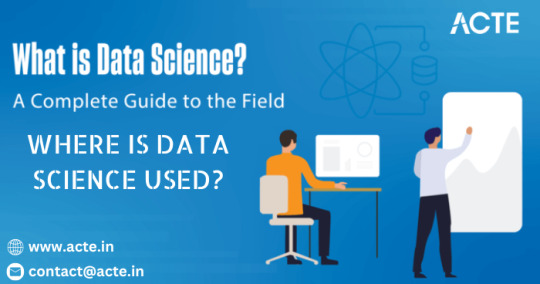
Healthcare: Pioneering Precision Medicine
In the healthcare sector, data science acts as a beacon of innovation. It plays a pivotal role in patient diagnosis, treatment optimization, and personalized medicine. By analyzing vast datasets, healthcare professionals can identify patterns, predict disease outcomes, and tailor treatments to individual patients. This not only enhances the efficiency of healthcare delivery but also contributes to groundbreaking advancements in medical research.
Finance: Navigating Risk and Detecting Fraud
The financial landscape is ripe for data science applications, particularly in risk management, fraud detection, and algorithmic trading. Data-driven models analyze market trends, assess risk exposure, and identify fraudulent activities in real-time. This not only safeguards financial institutions but also empowers them to make informed investment decisions, optimizing portfolios for better returns.
E-commerce: Crafting Personalized Experiences
In the bustling world of e-commerce, data science is the engine driving personalized experiences. Recommendation systems powered by data analysis understand user behavior, preferences, and purchase history. This results in tailored product suggestions, optimized pricing strategies, and a seamless shopping journey that boosts sales and enhances customer satisfaction.
Telecommunications: Enhancing Connectivity and Predicting Maintenance
Telecommunications companies leverage data science for network optimization, predictive maintenance, and customer churn analysis. By analyzing vast datasets, they can optimize network performance, predict potential issues, and proactively address concerns. This not only enhances the reliability of communication networks but also improves the overall customer experience.
Marketing: Precision in Targeting and Campaign Optimization
Marketers rely on data science for precision in targeting and campaign optimization. Customer segmentation, behavior analysis, and predictive modeling help marketers tailor their strategies for maximum impact. This ensures that marketing efforts are not only more effective but also cost-efficient, yielding higher returns on investment.
Education: Tailoring Learning Experiences
In the realm of education, data science is reshaping how students learn. Personalized learning experiences, performance analytics, and resource optimization are made possible through data analysis. By understanding student behavior and learning patterns, educators can tailor educational strategies to individual needs, fostering a more adaptive and effective learning environment.
Manufacturing: Predictive Maintenance and Quality Control
Manufacturing enterprises harness data science for predictive maintenance, quality control, and supply chain optimization. Analyzing data from sensors and production lines allows for predictive maintenance, minimizing downtime and reducing defects. This not only enhances operational efficiency but also contributes to cost savings. Choosing the best Data Science Courses in Chennai is a crucial step in acquiring the necessary expertise for a successful career in the evolving landscape of data science.
Energy: Sustainability and Operational Efficiency
Data science is a driving force in the energy sector, contributing to sustainability and operational efficiency. Predictive maintenance of equipment, analysis of energy consumption patterns, and optimization of energy production are facilitated through data-driven insights. This not only ensures reliable energy supply but also contributes to the global push for sustainable practices.
Transportation and Logistics: Optimizing Routes and Operations
In transportation and logistics, data science is instrumental in optimizing routes, predicting demand, and managing fleets efficiently. By analyzing data on traffic patterns, delivery times, and inventory levels, companies can optimize logistics operations, reduce costs, and improve overall service delivery.
Human Resources: Talent Acquisition and Workforce Planning
Human Resources (HR) departments utilize data science for talent acquisition, employee engagement analysis, and workforce planning. Analyzing data on employee performance, satisfaction, and recruitment processes enables HR professionals to make informed decisions, attract top talent, and optimize organizational performance.
Social Media: Enhancing User Engagement and Content Recommendation
Social media platforms leverage data science for enhancing user engagement and content recommendation. Algorithms analyze user interactions, preferences, and behaviors to recommend personalized content and improve overall user experience. This not only keeps users engaged but also enhances the platform's ability to deliver relevant content.
Government and Public Policy: Informed Decision-Making
In the realm of government and public policy, data science aids in informed decision-making. Analyzing data on various facets, including crime rates, resource allocation, and citizen services, enables governments to optimize policies for the welfare of the public. This data-driven approach enhances governance and contributes to more effective public services.
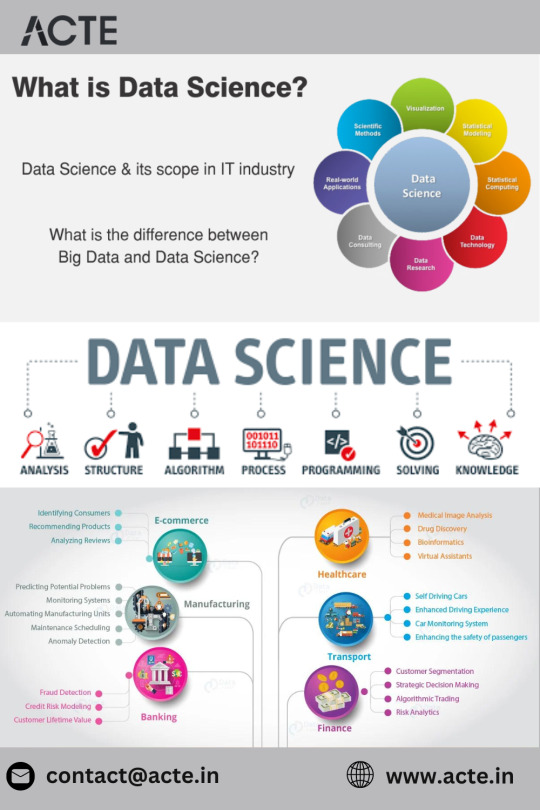
As we traverse the vast landscape of industries, it becomes evident that data science is not merely a tool but a transformative force that connects and elevates diverse sectors. Its ability to extract insights, predict outcomes, and optimize processes is reshaping the way businesses and institutions operate. In an era defined by data, data science stands as a thread weaving through the fabric of innovation, connecting industries and shaping the future of decision-making. As we continue to explore the frontiers of technology, the influence of data science is set to expand, leaving an indelible mark on the evolution of industries across the globe.
3 notes
·
View notes
Text
How AI Agent Development is Transforming Businesses and Automating Workflows
Artificial Intelligence (AI) is revolutionizing the way businesses operate, with AI agents playing a crucial role in automating workflows and enhancing efficiency. AI agents—intelligent software programs that autonomously perform tasks, make decisions, and interact with users or systems—are reshaping industries by reducing manual workloads and improving operational accuracy.

What Are AI Agents?
AI agents are software entities that leverage machine learning, natural language processing (NLP), and data analytics to execute complex tasks. These agents can range from chatbots and virtual assistants to advanced systems that automate supply chains, financial operations, and cybersecurity. Unlike traditional automation tools, AI agents continuously learn and adapt to changing environments, making them invaluable for modern businesses.
The Impact of AI Agents on Businesses
1. Enhanced Customer Service
AI-powered virtual assistants and chatbots are transforming customer support by providing instant responses, resolving common issues, and personalizing interactions. Companies like Klarna and Amazon have integrated AI chatbots to handle customer queries, significantly reducing wait times and improving user satisfaction.
2. Automating Repetitive Tasks
AI agents eliminate the need for human intervention in routine tasks such as data entry, scheduling, and document processing. This automation enhances productivity and allows employees to focus on high-value strategic activities. For instance, AI-powered workflow automation tools like UiPath and Automation Anywhere are streamlining business processes across industries.
3. Intelligent Decision-Making
AI agents analyze vast amounts of data to provide actionable insights, helping businesses make data-driven decisions. In financial services, AI models predict market trends and assess credit risks, while in healthcare, AI assists in diagnosing diseases and recommending treatments.
4. Supply Chain Optimization
AI-driven logistics solutions enhance supply chain efficiency by forecasting demand, managing inventory, and optimizing routes for delivery. Companies like Tesla and Walmart leverage AI agents to automate warehouse management and logistics operations, reducing costs and improving delivery speed.
5. Cybersecurity and Risk Management
AI agents help detect anomalies, prevent fraud, and enhance cybersecurity by continuously monitoring systems for threats. Businesses use AI-driven security tools to protect sensitive data and mitigate risks proactively. AI-powered fraud detection systems in banking and finance have significantly reduced cyber threats.
The Future of AI Agent Development
As AI technology continues to evolve, AI agents will become more sophisticated, handling even more complex tasks autonomously. The integration of AI with technologies like blockchain, IoT, and edge computing will further expand their capabilities.
Businesses that adopt AI agent development early will gain a competitive edge, reducing costs, increasing efficiency, and driving innovation. Whether in customer service, finance, healthcare, or logistics, AI agents are set to redefine the future of work.
Conclusion AI agent development is transforming industries by automating workflows and enhancing business operations. As companies increasingly rely on intelligent AI systems, the way we work will continue to evolve, unlocking new levels of productivity and efficiency. Organizations that embrace AI-driven automation will stay ahead in the ever-changing digital landscape.
0 notes
Text
Streaming Analytics Market – Industry Trends and Forecast to 2028 Research Report: Growth, Share, Value, Trends, and Insights

Streaming Analytics Market Size And Forecast by 2028
According to Data Bridge Market Research The streaming analytics market is expected to witness market growth at a rate of 30.18% in the forecast period of 2021 to 2028. Data Bridge Market Research report on streaming analytics market provides analysis and insights regarding the various factors expected to be prevalent throughout the forecast period while providing their impacts on the market's growth. The rise in the industrial application is escalating the growth of streaming analytics market.
Our comprehensive Streaming Analytics Market report is ready with the latest trends, growth opportunities, and strategic analysis. https://www.databridgemarketresearch.com/reports/global-streaming-analytics-market
**Segments**
- **Component**: The streaming analytics market can be segmented based on component into software and services. The software segment is expected to have significant growth due to the increasing adoption of streaming analytics platforms by organizations to gain real-time insights from data streams. Services segment includes professional services and managed services, with the latter expected to witness higher growth as organizations look for external expertise in setting up and managing streaming analytics solutions.
- **Deployment Model**: Based on deployment model, the market can be classified into cloud and on-premises. Cloud deployment is anticipated to dominate the market as it offers advantages such as scalability, cost-efficiency, and ease of access. On-premises deployment, although still preferred by certain organizations for data security reasons, is expected to witness slower growth compared to cloud deployment.
- **Organization Size**: In terms of organization size, the streaming analytics market can be segmented into small and medium-sized enterprises (SMEs) and large enterprises. SMEs are increasingly adopting streaming analytics solutions to gain competitive advantages through real-time data insights. However, large enterprises with their vast amounts of data are driving substantial growth in the market.
- **Industry Vertical**: The market can also be segmented by industry verticals including IT and telecom, healthcare, BFSI, retail, manufacturing, and others. Industries such as healthcare and retail are leveraging streaming analytics for personalized customer experiences and operational efficiency. BFSI sector is utilizing streaming analytics for fraud detection and risk management, contributing significantly to market growth.
**Market Players**
- **IBM Corporation**: IBM offers a comprehensive streaming analytics solution that helps organizations in processing and analyzing real-time data streams. The company's advanced analytics capabilities and extensive experience make it a key player in the market.
- **Microsoft Corporation**: Microsoft provides Azure Stream Analytics, a cloud-based solution for real-time data processing and insights generation. Its integration with other Microsoft products like Power BI enhances its value proposition in the streaming analytics market.
- **Amazon Web Services, Inc. (AWS)**: AWS offers Amazon Kinesis, a platform for real-time data streaming and analytics. Its scalable and flexible architecture makes it a popular choice among organizations seeking streaming analytics capabilities.
- **Google LLC**: Google Cloud Dataflow and Google Cloud Pub/Sub are prominent offerings from Google in the streaming analytics space. The company's expertise in data processing and machine learning further strengthens its position in the market.
The global streaming analytics market is poised for significant growth, driven by the increasing adoption of real-time data analytics solutions across industries. Key players are focusing on innovation and strategic partnerships to enhance their market presence and cater to the growing demand for streaming analytics services.
https://www.databridgemarketresearch.com/reports/global-streaming-analytics-market The streaming analytics market is witnessing a rapid evolution with the continuous advancements in technology and the increasing need for real-time insights in various industries. One emerging trend in the market is the integration of artificial intelligence and machine learning algorithms into streaming analytics platforms. This integration allows organizations to not only process and analyze data in real-time but also to derive predictive insights and automate decision-making processes based on the streaming data. As organizations strive to stay ahead of the competition and drive operational efficiency, the demand for more intelligent and automated streaming analytics solutions is expected to rise significantly.
Another impactful trend shaping the streaming analytics market is the rise of edge computing. Edge computing involves processing data closer to its source rather than transmitting it to centralized cloud servers for analysis. This approach reduces latency, enhances data privacy, and enables real-time decision-making at the edge of the network. Streaming analytics solutions that incorporate edge computing capabilities are becoming increasingly popular, especially in industries that require instant responses to data insights, such as IoT, manufacturing, and autonomous vehicles. The integration of edge computing with streaming analytics is poised to revolutionize how organizations harness the power of real-time data for driving business outcomes.
Moreover, the concept of hybrid deployment models is gaining traction in the streaming analytics market. Organizations are looking for flexible deployment options that combine the benefits of both cloud and on-premises solutions. Hybrid deployment models allow organizations to leverage the scalability and cost-efficiency of the cloud while maintaining control over certain sensitive data through on-premises infrastructure. This hybrid approach enables organizations to customize their streaming analytics deployments based on their specific requirements, ensuring optimal performance and data security while also accommodating dynamic workloads and varying data processing needs.
Furthermore, the streaming analytics market is witnessing increased competition among vendors, leading to a greater focus on product differentiation and industry-specific solutions. Vendors are expanding their product portfolios to cater to the unique needs of different industry verticals, such as healthcare, retail, and banking. Customized streaming analytics solutions that address industry-specific challenges and compliance requirements are gaining popularity among organizations looking to extract maximum value from their data streams. Vendors that can demonstrate domain expertise and provide tailored solutions for specific verticals are likely to capture a larger market share and establish long-term partnerships with industry leaders.
In conclusion, the global streaming analytics market is undergoing a transformative period characterized by technological innovations, shifting deployment preferences, and industry-specific use cases. As organizations across various sectors continue to prioritize real-time data analytics for driving business growth and competitiveness, the demand for advanced streaming analytics solutions is expected to soar. Vendors that can adapt to changing market dynamics, embrace emerging technologies like AI and edge computing, and deliver tailored solutions for different industries will be well-positioned to capitalize on the expanding opportunities in the streaming analytics market.**Segments**
Global Streaming Analytics Market, By Application (Fraud Detection, Sales and Marketing, Predictive Asset Management, Risk Management, Network Management and Optimization, Location Intelligence, Supply Chain Management and Others), Deployment Type (Cloud and On-Premises), Industry Vertical (Banking, Financial Services, and Insurance, Telecommunication and IT, Retail and E-commerce, Healthcare and Life Sciences, Manufacturing, Government, Energy and Utilities, Transportation and Logistics, Media and Entertainment, and Others), Type (Software and Services), and Country (U.S., Canada, Mexico, Brazil, Argentina, Rest of South America, Germany, Italy, U.K., France, Spain, Netherlands, Belgium, Switzerland, Turkey, Russia, Rest of Europe, Japan, China, India, South Korea, Australia, Singapore, Malaysia, Thailand, Indonesia, Philippines, Rest of Asia-Pacific, Saudi Arabia, U.A.E, South Africa, Egypt, Israel, Rest of the Middle East and Africa) Industry Trends and Forecast to 2028.
**Market Players**
- The major players covered in the streaming analytics market report are IBM, Oracle, Microsoft, SAP ERP, Software AG, SAS Institute Inc., TIBCO Software Inc., Streamanalytix., Striim, Inc., WSO2, Informatica, SQLstream, Inc., EsperTech Inc, INETCO Systems Ltd, Axonize, Vitria, Striim, Inc., EVAM, Zoomdata, and Adamos GmbH among other domestic and global players. Market share data is available for global, North America, Europe, Asia-Pacific (APAC), Middle East and Africa (MEA), and South America separately. DBMR analysts understand competitive strengths and provide competitive analysis for each competitor separately.
The global streaming analytics market is witnessing significant growth and transformation driven by technological innovations, industry-specific trends, and the increasing demand for real-time data analytics solutions across various sectors. With the integration of artificial intelligence and machine learning algorithms, streaming analytics platforms are evolving to provide predictive insights and automate decision-making processes in real-time, enhancing operational efficiency and competitive advantages for organizations. The rise of edge computing is also reshaping the market, enabling instant responses to data insights and enhancing data privacy and latency reduction, particularly in IoT, manufacturing, and autonomous vehicles industries. Hybrid deployment models are gaining traction as organizations seek flexible options combining cloud scalability with on-premises data control for optimal performance and security.
Furthermore, the streaming analytics market is witnessing intensified competition among vendors, leading to a focus on product differentiation and industry-specific solutions to cater to diverse verticals such as healthcare, retail, and banking. Tailored streaming analytics solutions addressing industry-specific challenges and compliance requirements are gaining popularity, with vendors showcasing domain expertise and customized offerings to maximize the value extracted from data streams. As organizations prioritize real-time data analytics for business growth and competitiveness, the demand for advanced streaming analytics solutions is expected to rise. Vendors that embrace emerging technologies, adapt to market dynamics, and provide tailored solutions for different industries are well-positioned to capitalize on the expanding opportunities in the streaming analytics market.
The market is highly fragmented, with a mix of global and regional players competing for market share. To Learn More About the Global Trends Impacting the Future of Top 10 Companies in Streaming Analytics Market : https://www.databridgemarketresearch.com/reports/global-streaming-analytics-market/companies
Key Questions Answered by the Global Streaming Analytics Market Report:
What is the current state of the Streaming Analytics Market, and how has it evolved?
What are the key drivers behind the growth of the Streaming Analytics Market?
What challenges and barriers do businesses in the Streaming Analytics Market face?
How are technological innovations impacting the Streaming Analytics Market?
What emerging trends and opportunities should businesses be aware of in the Streaming Analytics Market?
Browse More Reports:
https://www.databridgemarketresearch.com/reports/global-reactive-hot-melt-adhesives-markethttps://www.databridgemarketresearch.com/reports/global-asthma-inhaler-device-markethttps://www.databridgemarketresearch.com/reports/global-surgical-chips-markethttps://www.databridgemarketresearch.com/reports/global-spinal-infection-markethttps://www.databridgemarketresearch.com/reports/global-tree-trimmers-market
Data Bridge Market Research:
☎ Contact Us:
Data Bridge Market Research
US: +1 614 591 3140
UK: +44 845 154 9652
APAC: +653 1251 982
✉ Email: [email protected]
0 notes